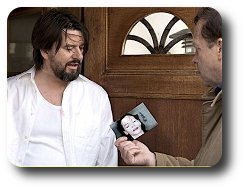Sunday 31 October, 1.45pm until 3.15pm, Lecture Theatre 2
 From HBO’s The Wire to the international success of Stieg Larsson’s Millennium trilogy, crime fiction has rarely been so popular. While the detective story has always held a particular hold over the imagination of the reading public – from Sherlock Holmes and Miss Marple through to Inspector Morse and Ian Rankin’s Rebus – in recent years the genre has moved from bestselling niche to global phenomenon. Yet while many praise the social critique present in the work of writers such as Henning Mankell and Dennis Lehane, others are concerned by the increasingly gruesome nature of the crimes on display, and particularly the way in which lurid violence against women and children is described with apparent relish.
From HBO’s The Wire to the international success of Stieg Larsson’s Millennium trilogy, crime fiction has rarely been so popular. While the detective story has always held a particular hold over the imagination of the reading public – from Sherlock Holmes and Miss Marple through to Inspector Morse and Ian Rankin’s Rebus – in recent years the genre has moved from bestselling niche to global phenomenon. Yet while many praise the social critique present in the work of writers such as Henning Mankell and Dennis Lehane, others are concerned by the increasingly gruesome nature of the crimes on display, and particularly the way in which lurid violence against women and children is described with apparent relish.
Similarly, while audiences have lapped up troubled anti-heroes from the ‘shop-soiled Galahad’ Philip Marlowe onwards, today’s sleuths are less likely to be Chandleresque characters conflicted over morality than hyper-rational agents bringing order to the chaos around them. Hit series Dexter, for example, combines forensic investigation with vigilante revenge on criminal low-life; Millennium’s heroine Lisbeth Salander is an autistic super-hacker with a photographic memory and the only certainty in CSI is that ‘the evidence never lies.’
If, as GK Chesterton wrote, detectives represent the ‘unsleeping sentinels’ of civilisation, does the current fixation reflect an unhealthy obsession with the darkness at the fringes of that civilisation, and the potential killer inside all of us, or are fictional detectives simply the last bastions of virtue in a morally uncertain world? Given that today’s top sleuths are just as likely to work outside the law as within it, does their popularity reveal something about contemporary attitudes to the state and justice? Or is exploring society’s dark underbelly simple escapism for those living increasingly safe and risk-averse lives?
Listen to session audio:
 | Ruth Dudley Edwards historian and journalist; author, The Seven: the lives and legacies of the founding fathers of the Irish Republic (forthcoming) |
 | Gerry Feehily Europe editor, Courrier International; author, Gunk |
 | Sophie Hannah poet; novelist; author, Pessimism for Beginners and A Room Swept White |
 | Mick Hume editor-at-large, online magazine spiked; author, Trigger Warning: Is the Fear of Being Offensive Killing Free Speech? |
| Chair: | |

|
David Bowden
associate fellow, Academy of Ideas; culture writer |
 Fliss Benson is a TV producer struggling to deal with a personal tragedy in her own life. She receives at work an anonymous card which consists of 16 numbers arranged in four rows of four.
Fliss Benson is a TV producer struggling to deal with a personal tragedy in her own life. She receives at work an anonymous card which consists of 16 numbers arranged in four rows of four.
Sophie Hannah, Hodder, 19 August 2010
Why the most peaceful people on earth write the greatest homicide thrillers.
Nathaniel Rich, Slate, 9 July 2010As I grow older, I become exhausted by the need to show ever more explicit violence – in cinema and journalism
Ryan Gilbey, Guardian, 6 May 2010He's used to people calling his books 'a guilty pleasure' and he knows just what that means in this country. 'People are a little ashamed of downmarket connotations. They should really be reading the Ian McEwan but they're reading the Lee Child because they like it better and they feel guilty about that.'
David Sexton, Evening Standard, 31 March 2010'I don't really see the point of making up crimes,' the Red Riding quartet author tells website
Alison Flood, Guardian, 10 February 2010Normally when an author finds great success they are around to satisfy the curiosity of their readers.
Finlo Rohrer, BBC Magazine, 29 January 2010The distinction between crime and thrillers on the one hand and
Sean O'Brien, Times Literary Supplement, 21 January 2010 Why Marlowe is still the chief of detectives
Why Marlowe is still the chief of detectives
Fifty years after Raymond Chandler died, we need his ‘shop-soiled’ Galahad Philip Marlowe as much as ever to put our mixed-up world to rights.
Mick Hume, spiked, 1 January 2010
 Battered to death with a piece of abstract sculpture titled 'Reconciliation,' Whitehall departmental head Sir Nicholas Clark is claimed by his colleagues to have been a fine and respected public servant cut off in his prime.
Battered to death with a piece of abstract sculpture titled 'Reconciliation,' Whitehall departmental head Sir Nicholas Clark is claimed by his colleagues to have been a fine and respected public servant cut off in his prime.
Ruth Dudley Edwards, Poisoned Pen, 12 March 2008
The Credit Crunch Demystified - It's not a recession but a weakened economy
"Only the Battle of Ideas could provide the platform for a discussion about a GCSE Science exam where the atmosphere was so electric. It felt like a battle for the soul of British education."
Philip Walters, chairman, Rising Stars educational publishers